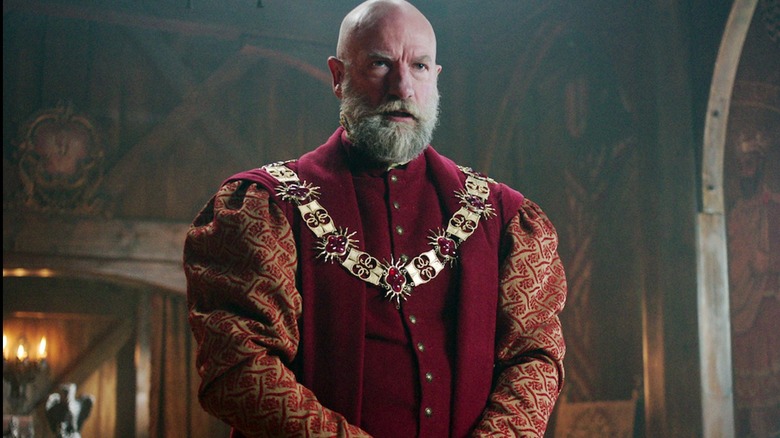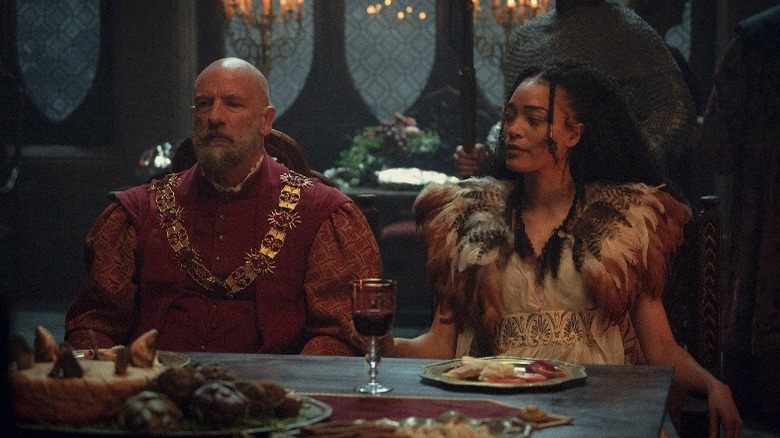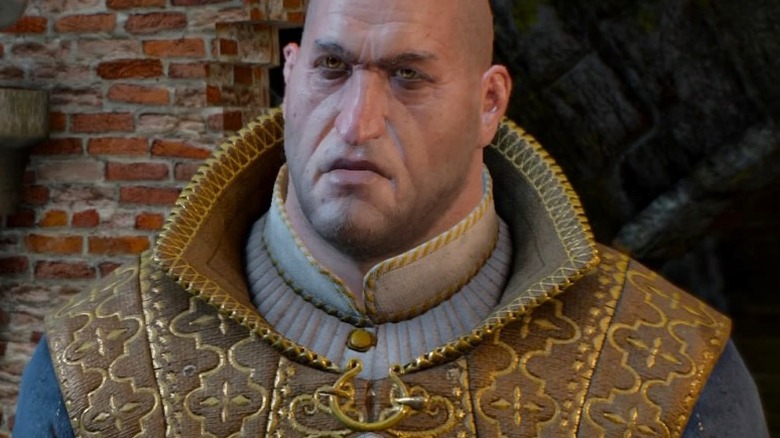What Sets The Witcher Apart From House Of The Dragon For Dijkstra Actor Graham McTavish
This post contains spoilers for Netflix's "The Witcher," and the source material.
Graham McTavish has mastered the art of embodying franchise characters. In "Outlander," he's a ruthless and objective war chieftain named Dougal Mackenzie, and in "House of the Dragon," he plays the loyal and steadfast Ser Harrold Westerling, former Commander of the Kingsguard. Playing characters with such varied personalities and moral compasses is almost second nature to McTavish and his role as Sigismund Dijkstra in Netflix's "The Witcher" opens up new avenues to explore ethical ambiguities. Dijkstra's allegiances are hard to pin down as they constantly shift with situations — an Oxenfort graduate with exceptional intelligence, Dijkstra is an asset for the Redanian empire and flits between enemy and ally when it comes to Geralt of Rivia (Henry Cavill).
In season 3 of "The Witcher," Dijkstra steps up his game, colluding with his partner Philippa Eilhart (Cassie Clare) to change the power structure in Redania, and by extension, the rest of the Continent. At the end of Vol. I, he looks especially shady during the Thanedd Ball, urging Geralt to pick a side and machinating from the shadows to manipulate and use Radovid (Hugh Skinner) to do his bidding. This kind of role is markedly different from that of Harrold Westerling, as the latter is a grounded man with a compassionate heart, which is a rare sight in the "Games of Thrones" universe. As Dijkstra, McTavish gets to dress in lavish, colorful garments and have fun with the character's complex eccentricities while embodying qualities that are both irksome and somewhat endearing.
How does working on "The Witcher" set differ from that of "The House of the Dragon"? This is what McTavish had to say about working on the Netflix series.
Holding space for humor
Dijkstra, while a scheming mastermind, also finds himself in embarrassing situations in the Netflix show, especially after his plans are foiled unexpectedly. The books describe him as a spy for King Vizimir II, and the show highlights the everyday awkwardness Dijkstra has to experience while dealing with the foolish, bumbling king. This provides an interesting contrast to his more serious, cunning nature, such as when he kills Vizimir's wife in cold blood and orchestrates events to rile the king up against Nilfgaard. McTavish spoke to GamesRadar+ about this fun duality, and how the show allows Dijkstra to embrace humorous, laid-back moments:
"One of the things I really appreciate about The Witcher is the humor, actually. The humor of all the characters, Dijkstra being one of them. Everybody has humorous interchanges, and I think that personally distinguishes the shows."
The brutality inherent in Dijkstra is never compromised, but he is also allowed a few human moments where he's not just rubbing his hands together and hatching evil schemes. There's tenderness in the relationship he shares with Philippa, even though their bond has a bit of an edge, and this to-and-fro allows him to assume some sort of dimensionality in a show with innumerable characters who can be rather difficult to keep track of.
McTavish also goes on to talk about the many facets of Dijkstra that still remain under wraps, calling him "very kind, very thoughtful," on choice occasions that are rare to witness. McTavish also references certain character quirks in the books, stating that Dijkstra's "obsession with macrame and knitting are really very well known in Redania" but we just don't get to see those aspects at this juncture.
What's Dijkstra like in the books?
In "Blood of Elves," "The Witcher" novel series writer Andrzej Sapkowski describes Dijkstra in considerable detail, stating that he looked nothing like the stereotypical spy and embodied the epitome of deceptive appearances. Unlike the standard expectations surrounding spies who are quick, nimble, and hard to spot, Dijkstra stood out due to his seven-foot-tall stature and preferred to dress in flashy attire instead of camouflaging himself. This, as it turns out, was a smart move, as the average person would never pin him for a spy, let alone one who provided critical intelligence to the King of Redania. Dijkstra was often known for his signature phrase, where he said that if darkness reigned all around noon, it was time to worry about the fate of the sun.
After Vizimir is assassinated in the books, Dijkstra takes on the role of negotiator during the peace treaty with Nilfgaard and enjoys considerable power as a part of the interim Regency Council after the king's death. After some time, Dijkstra finds himself betrayed and has to flee Redania, after which he assumes the monicker, Sigi Reuven. As for his relationship with Geralt, it is pretty hot and cold — the two work together when their goals are aligned, and even maintain a respectful professional relationship, but the moment they are at odds, they immediately end up opposing one another.
In fact, in "The Witcher 3: The Wild Hunt," the player has a choice to either side with Dijkstra or betray him, and if they choose the latter, Dijkstra dies after overestimating Geralt's neutral stance. Will something similar happen in the Netflix show, where Dijkstra ends up being betrayed by those he considers harmless? Only time will tell.


